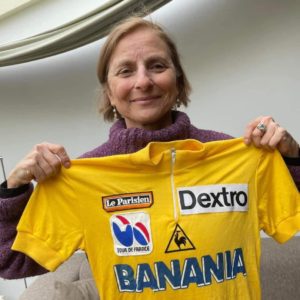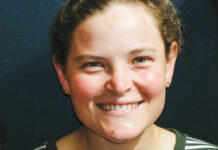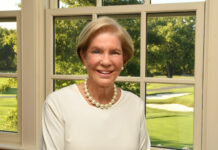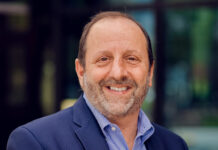Journalist and documentary filmmaker Jill Yesko traveled to France recently to film her third documentary, titled “Uphill Climb.” It tells the story of the first women who officially competed in the Tour de France from 1984 through 1989. A former competitive cyclist, Yesko represented the U.S. in the 1983 World University Games and in the Olympic trials.

The 64-year-old Mt. Washington resident was previously a contributing writer for local publications such as The Baltimore Sun and specialty publications like Women’s Sports & Fitness magazine, She is currently host of the podcast “The Bounce: Sports with a Spin” on NPR.
Yesko’s two previous documentaries delve into the darker world of sports. Her first was “Tainted Blood: The Untold Story of the 1984 Olympic Blood Doping Scandal.” Yesko remembers the blood doping scandal vividly. “The cycling community was a small community,” she said. “The U.S. had won so many medals at the L.A. Olympics. I wasn’t a journalist yet at that time, but I knew then that it was an important story to tell.”
World class athletes, members of the U.S. Olympic Team, underwent blood transfusions in an attempt to enhance their performance. “I wanted to tell the story wholistically, to understand why they doped when they were very well-trained, and when our toughest competitors, the Russians, had decided to boycott the Olympics,” she said.
Yesko’s first documentary took four years and was self-funded. Upon completion, she showed the film at a number of film festivals. She held the premiere in Baltimore, with screenings in Colorado and New York City.
That film was followed by “Broken Trust: Athlete Abuse Exposed,” which exposed the physical and sexual abuse experienced by many world class athletes.
She is still working to raise funds for her third film, “Uphill Climb,” a project she started in January 2020 right before the pandemic struck. Things ground to a halt as Yesko hunkered down at home like everyone else. Then her mother, who lived in Florida, died in July 2020.
“My mom died of COVID, and I was not able to see her,” said Yesko. Unable to work and grieving the loss of her mother, Yesko became depressed. “My father died 15 years ago and losing him felt like losing one of the stars in heaven. But when you lose your mom, your sun is gone.”
In the midst of grief and isolation due to the pandemic, the memory of her mother’s words propelled Yesko to slowly but surely get back on her feet. “She was my biggest cheerleader,” Yesko said. “She would tell me, ‘You can do it, I believe in you,’”
Yesko grew up in Bergen County, New Jersey, in a Conservative Jewish family. “My father was very proud that he was born in Patterson, New Jersey, and proud to be Jewish,” shared Yesko. “My mom was from New York, and my father would tell a very ‘dad joke,’ often kidding that they had a mixed marriage because he was from New Jersey and she was from New York.”
Yesko earned bachelors and a masters degrees in geography from Rutgers University before heading to Syracuse University to add a doctorate in the subject to her credentials. She left before completing her dissertation, however, and laughed recalling the early days after she wound up in Baltimore.
“My first job, as a 31-year-old, was working in a water taxi, telling people 8,000 times a day, ‘Yes, that’s the Domino Sugar sign.’ . . . It was an interesting time,” she said.
Thankfully, Yesko started freelancing for the City Paper not long after coming to Baltimore.
Today, Yesko shares her home with Lars, her four-and-a-half-year-old basset hound, and three hamsters: Jack Rabbit, Mr. Spock, and Alvin. In conversation, Yesko’s sense of humor and strong work ethic come across clearly, but she also attributes her accomplishments as a cyclist, journalist, and documentary filmmaker to the words of two loving parents: her mother, who Yesko said would often say, “Just do it. What are you waiting for?” and her father, who would tell her, “Get out there! No one is going to come to your door — you have to make your own way. Don’t be shy.”







